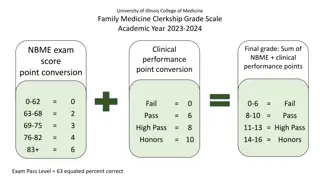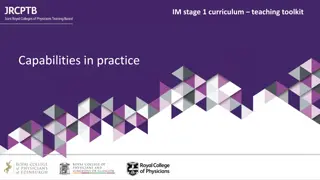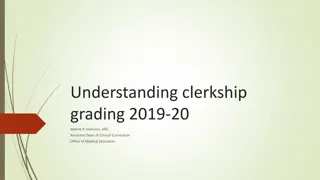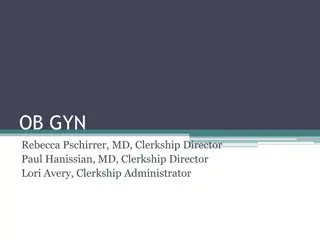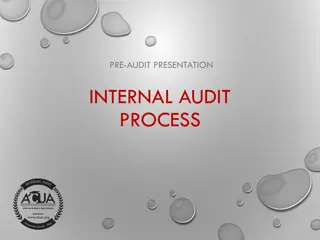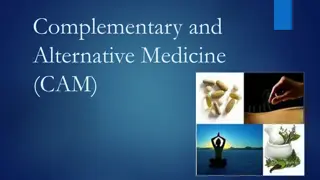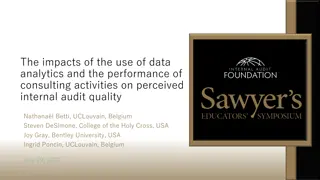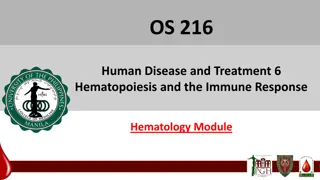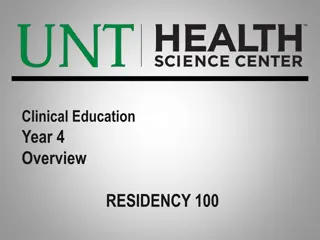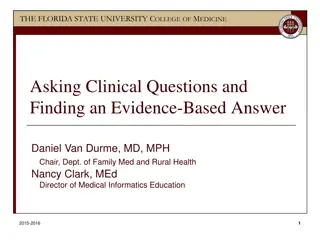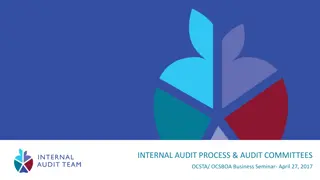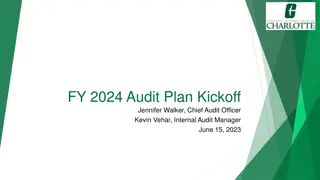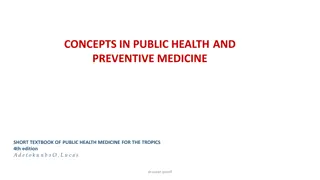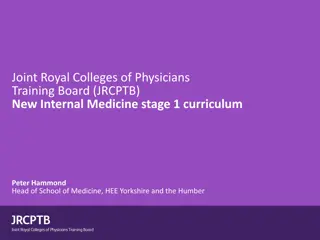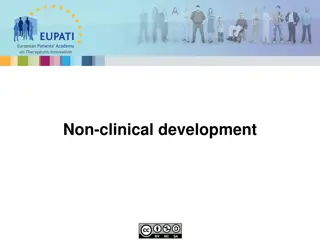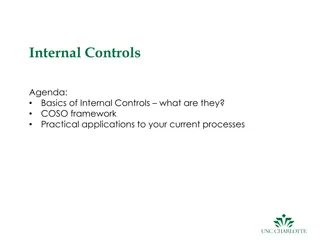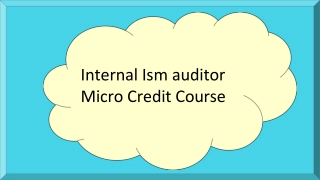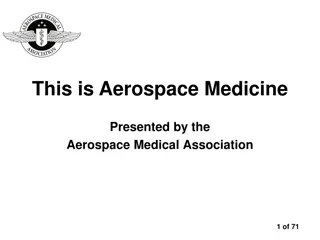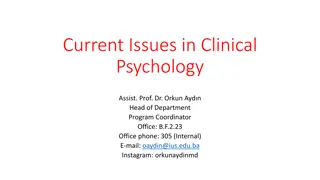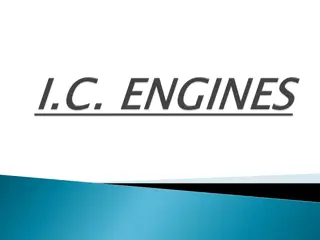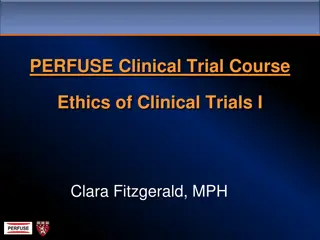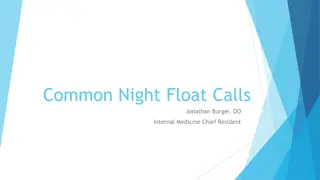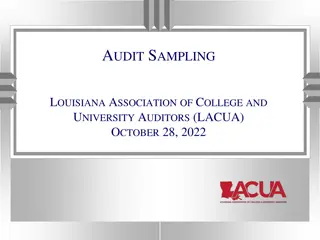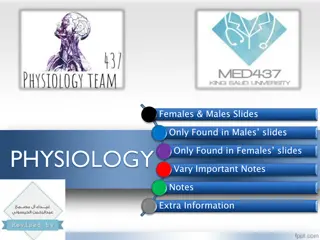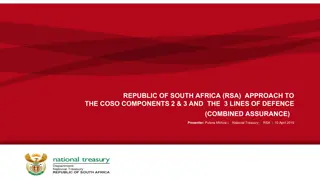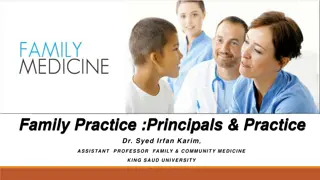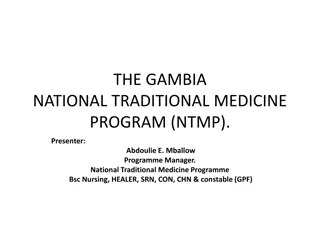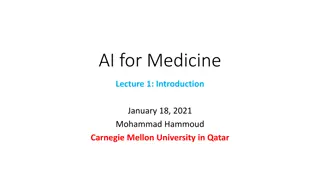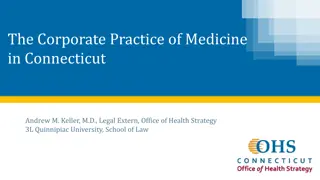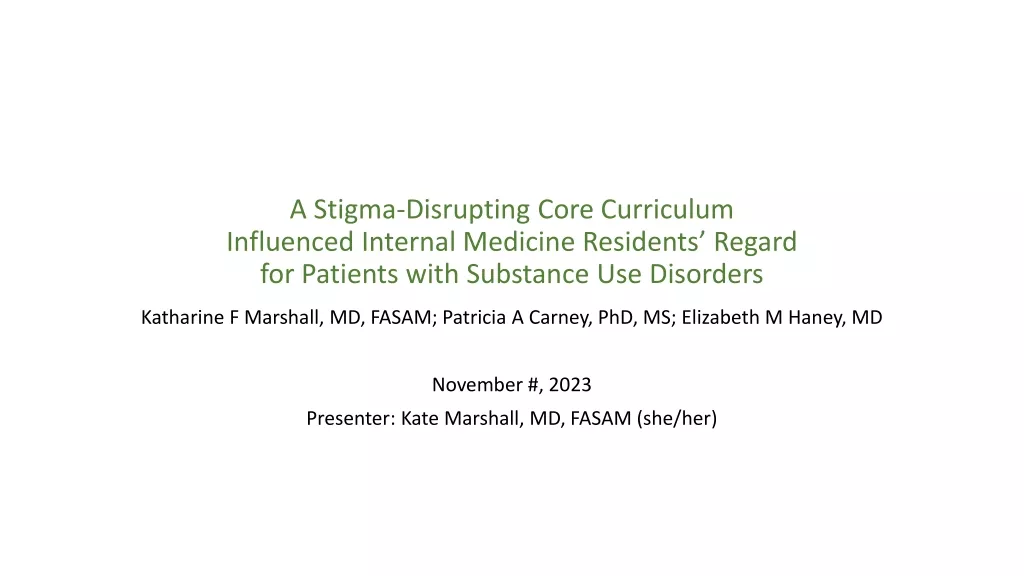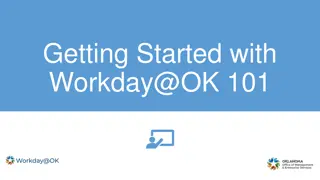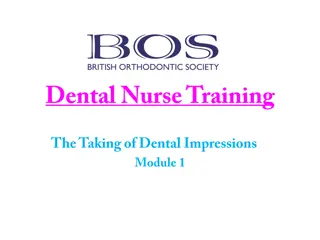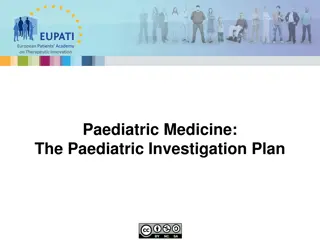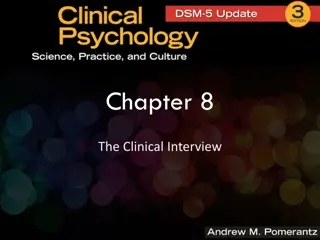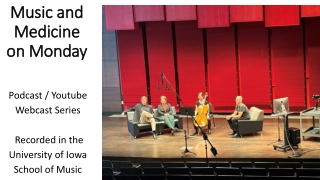Clinical Clerkship in Internal Medicine: Comprehensive Training Course Overview
This clinical clerkship in internal medicine offers a 6-week training program focusing on the management of common and critical medical conditions. Students will learn to diagnose, treat, prevent, and control diseases, with an emphasis on correlating pathophysiology to patient history and data. The course aims to develop skills in diagnostic reasoning, treatment planning, and interpersonal communication, preparing students to work effectively within a healthcare team.
Download Presentation

Please find below an Image/Link to download the presentation.
The content on the website is provided AS IS for your information and personal use only. It may not be sold, licensed, or shared on other websites without obtaining consent from the author. Download presentation by click this link. If you encounter any issues during the download, it is possible that the publisher has removed the file from their server.
E N D
Presentation Transcript
MEDICINE 251 Clinical Clerkship in Internal Medicine AY 2022 - 2023
CONSULTANT MONITORS Dr. Lia Aileen Palileo-Villanueva Dr. Teresita Dumagay Dr. Diana Tamondong-Lachica Dr. Michael San Juan Year Level Committee RESIDENT MONITORS Dr. Marvin Espino Dr. Eladio Anino V Dr. Marc Lharen Barsabal Dr. Marvin Mangulabnan Dr. Brian Alvarez Dr. Chin Vista
A 6-week comprehensive training course in the clinical management of common and important medical diseases in a setting that may require ward or critical care unit admission with focus on diagnosis, treatment, prevention, and control. Course Description
At the end of the course, the student should be able to: correlate the pathophysiology of the patient's disease to the history, physical examination and laboratory data in order to arrive at a definitive diagnosis and differential diagnosis of common diseases and some less common but serious/life threatening diseases acquire skills in organizing and presenting information pertinent to the diagnosis and differential diagnosis Course Objectives propose diagnostic and therapeutic plans and perform specific diagnostic and therapeutic interventions demonstrate sensitivity to the human needs and social implications of the patient's disease work harmoniously with peer groups, supervisor and related coworkers and develop good interpersonal relationship with all the personnel involved in the care of his patient
Introduction to Blood Component Therapy Acid-base/Electrolyte disorders Acute renal failure Chronic kidney disease Tuberculosis Sepsis Pyelonephritis Dengue Leptospirosis Acute infectious diarrheal diseases and bacterial food poisoning Infectious Arthritis Typhoid COVID Malaria Recognition of Connective tissue diseases Prevention of Nosocomial Infections Anaphylaxis Patient Safety Coronary Artery Disease and Acute Coronary Syndromes Hypertensive emergency/urgency Heart Failure Common arrhythmias (Atrial Fibrillation, Supraventricular Tachycardia, Ventricular Tachycardia, Ventricular Fibrillation) Rheumatic Heart Disease/Rheumatic Fever Acute Respiratory Failure Pneumonia Pleural effusion COPD/Asthma Diabetes mellitus including Diabetic Emergencies Thyroid Storm GI bleeding Liver disease, including hepatic encephalopathy Intoxications/ poisoning cases Febrile Jaundice Must Know Topics
ABG Interpretation ECG Interpretation Chest X-ray Reading IV cannulation Venous Blood extraction ABG sample extraction Foley Catheter insertion NGT insertion Proper Donning and Doffing Essential Skills
Harrisons Principles of Internal Medicine 20thed. (Longo DL, Fauci AS, Kasper DL, Hauser SL, Jameson J, LoscalzoJ. eds.Harrison's Principles of Internal Medicine, 20e. New York, NY: McGraw-Hill; 2018) -Note that we already have the 21stedition made available just this June 2022 References Latest Clinical Practice Guidelines for specific diseases (e.g. CAP, GOLD, GINA, ACS, Sepsis, etc)
Activities will remain a hybrid of online and F2F activities but F2F activities will be emphasized Students will have a total of 6 weeks in the Department 3 weeks in the 1stsem (Aug 29 Dec 11) 3 weeks in the 2ndsem (Jan 2 May 21) Changes for AY 2022 - 2023 Rotation will include 2 weeks of OPD rotation
For the entire year: 2 weeks Outpatient General Medicine 4 weeks Inpatient Medicine Ward (Non-COVID areas only) For each sem: 1 week Outpatient General Medicine 2 weeks Inpatient Medicine Ward (Non-COVID areas only) Course Rotation WEEK 1 2 3 4 5 6 ROTATION OPD Ward Ward OPD Ward Ward For block 9 only: WEEK 1 2 3 4 5 6 ROTATION Ward Ward OPD Ward Ward OPD
Week/ Day 1 OPD Mon Tues Wed Thurs Fri Sat Sun Lectures Made Available Department Conference** Department Conference** ECG, ABG, CXR Ward Work++ Ward Work++ Ward Work++Ward Work++ 2 Department Conference** Department Conference** Ward Work++ Ward Bioethics Discussion^^ Ward Work++ Department Conference** Ward Work++ Department Conference** Ward Work++ Ward Work++ Ward Work++Ward Work++ 3 Ward Work++ Ward Bioethics Discussion^^ Ward Work++ Ward Work++
Before heading to your designated post for the day (whether OPD or ward), make sure to check temperature and check for COVID symptoms if with symptoms DO NOT go to the hospital please notify buddy/LO and safety officer SAFETY REMINDER
Introduce yourself to Consultant (Adult Med) or Resident (team captain) Take History and PE of patient and come up with diagnosis and plan Present to Consultant or Resident your patient and have them check your plan and disposition of patient Prioritize new patients but may also see follow- up patients OPD Rotation
OPD daily schedule If you are not at the OPD physically, take the time to go thru the introductory lectures, patient safety module, bioethics module, and to read up on must know topics.
Patient Census (Patient Initials only and Diagnosis) countersigned by resident/consultant At least 1 consultant graded patient presentation Patient Safety Case presentation on 2nd sem OPD rotation (finalize schedule with Dr Lachica) OPD Rotation Output (for the entire year)
Attendance sheets outside Patient Education Room/Medicine Office Official time-in (AM duty): 7 AM Official time-in (PM duty): 7 PM Late: 7:10 to 7:30 AM Considered absent: later than 7:30 AM 3 lates = 1 unexcused absence No signature = 1 unexcused absence Attendance at Guazon Hall will be checked by resident monitors and/or seniors Attendance
Always sign the attendance sheet If absent or unable to sign on time: Submit a letter addressed to the LU6 Committee to resident monitors for excused absence/late within 3 days Have your WAPOD/RIC sign the letter indicating the reason for failure to sign the attendance on time Attendance No excuse letter = unexcused absence Missed duties/absences will have corresponding make up duties/activities
6 General Medicine Services 2-3 consultants (with 1 LU consultant), 1 senior resident, 2-3 junior residents, 6 interns, 3-4 clerks each service admits patients every 6 days General Medicine Services 3 duty teams: each duty team is composed of 2 sister services sister services (residents) go on duty every 3 days
Clerks will be divided among the 6 Gen Med Services 3-4 clerks per service clerks will remain with the same service for the entirety of their ward rotation per sem General Medicine Services Assignment Clerks will be assigned a maximum of 5 co- managed patients per service co-SIC will be another clerk
Accomplish clinical abstract and discharge summaries of assigned patients Updates the details of the their assigned patients in RADISH service census May do procedures (BE, ABG, Foley, IV, NGT insertion, etc) and make requests for imaging/blood requests (supervised by the RIC/WAPOD) Attendance in all physical and Zoom service rounds (prioritize rounds with LU consultants) Monitor patients needing HOURLY monitoring (supervised by the RIC/ROD) and refer deranged vitals (if unsure, don t hesitate to ask) General Medicine Services Activities
Make sure you see your patients Discuss management with residents, fellows and consultants General Medicine Services Activities During periods with no bedside activity, you may stay in the callroom
GUAZON ENDORSEMENTS presided by JWAPODs 730-9AM moderated by pre-duty Gen Med and Pay Senior Ward Endorsements
WAPOD Endorsements Facilitated by the WAPOD of the Specific WARD 6-630PM 7-730PM Endorsements of Q1 monitoring patients by SICs General Info, Current assessment, Watch out for and What to do, Endorse procs Brief endorsements ONLY, lectures/learnings discouraged Floor Manager should be assigned by the duty team Attendees: WAPOD, JWAPOD, Duty Team of that Ward and SICs Ward Endorsements
There are 3 Posts for Gen Med Services Pre-duty, Post-duty and Duty Clerks will follow these duty posts with the exemption of the night duty During night duty, only 1 clerk per Duty Service will be present Clerks who went on night duty will have a true post duty status the next day (may leave after endorsements) Duty Posts
Receiving endorsements from AM duty team Monitoring Procedures Conductions/accompany patients within PGH Preparing for morning endorsements Night Duty
Time Activity 7:00AM Time In; Check on patients 7:30AM Guazon Endorsements 9:00AM Check on Patients/Do Procedures/Attend Rounds 6:00PM WAPOD Endorsements Sample Daily Schedule 7:00PM Home Time Activity 6:00PM Time In; WAPOD Endorsements 7:ooPM Monitoring/Procedures 7:00AM Time In 7:30AM Guazon Endorsements 9:00AM Home
Patient Census (Patient Initials only and Diagnosis) countersigned by resident/consultant At least 1 consultant graded patient presentation 2 Written Case Discussion (at end of week 3 and week 5) Bioethics Discussion (finalize schedule with Dr San Juan for 1st sem and Dr Gueco for 2nd sem) Ward Rotation Output (for the entire year)
Course Activities/Requirements
Requirement % Grade Comment Consultant Cognitive Evaluation 30% At least 1 inpatient and 1 OPD Clinical Performance: Consultant 10% At least 2 either LU or ward consultant Course Requirements (for the entire 6-week rotation) Clinical Performance: Resident 5% At least 2 1 senior and 1 junior Peer Evaluation 5% Written Case Discussion 20% 1 after week 3 and 1 after week 5 Final Examination 15% 100 items MCQ Comprehensive Examination 10% Bioethics Reaction Paper and Discussion 5% Portfolio Formative Patient census; Procedure log; Introductory Lecture Assignments
**If comprehensive exam will be deemed formative the 10% allotted to it will be divided between final exam and written case discussion ***If a student fails the final examination or has a failing overall grade then they will be required to have a remedial activity. The remedial activity is a pass or fail activity. Course Requirements (for the entire 6-week rotation) has a passing overall grade, his/her final grade will be the overall grade once the student passes the remedial activity. - If the student fails the final examination but his/her final grade will be the equivalent of a 3.00 once the student passes the remedial activity. - If the student has a failing overall grade,
Evaluation is based on oral case presentation (individual) Students should have at least 2 evaluations from consultants 1 from OPD and 1 from inpatient For inpatient evaluation we will be assigning a consultant who will grade student presentation on week 6 (students will be allowed to choose which patient they will discuss) Final score for this course requirement will be an average of all evaluations made by consultants throughout the entire year (both 1st and 2nd semesters) Summative Evaluation: Consultant Cognitive Evaluation
Grading Sheet
Evaluation may come from LU consultant or ward consultant Based on Behavior and Attitude Students should have at least 2 evaluations from consultants Final score for this course requirement will be an average of all evaluations made by consultants throughout the entire year (both 1st and 2nd semesters). Summative Evaluation: Consultant Clinical Performance Evaluation
Grading Sheet
Evaluation may come from senior or junior IM resident Based on Behavior and Attitude Students should have at least 2 evaluations from 2 different residents Final score for this course requirement will be an average of all evaluations made by residents throughout the entire year (both 1st and 2nd semesters). Summative Evaluation: Resident Clinical Performance Evaluation
Grading Sheet
Evaluation done at the end of the year Based on Behavior and Attitude Students should have at least 1 evaluation from another clerk who was on the same service or they went on duty (OPD or ward) Final score for this course requirement will be an average of all evaluations made by clerks throughout the entire year (both 1st and 2nd semesters). Summative Evaluation: Peer Evaluation
Grading Sheet
written case discussion will be based on a case handled by the clerks in the wards students are allowed to pick which case they will discuss students will be asked to submit a total of 2 written case discussions Summative Evaluation: Written Case Discussion
Grading Sheet
Summative Evaluation: Bioethics Module The numerical grade for this requirement will be an average of the score from the reaction paper and the synchronous case discussion.
Summative Evaluation: Final Examination This will be given at the end of the year. The examination will consist of 100 multiple choice questions on the must know topics and essential skills.
5 annotated lectures by our faculty are as follows: 1. ECG Interpretation 2. ABG Interpretation 3. Chest x-ray Reading 4. Fluids and Electrolytes 5. Telemedicine Formative Evaluation: Introductory Lectures and Curated Content Curated materials are for the following topics: 1. Concept mapping 2. Making problem lists 3. Essential Skills 4. Patient Safety
Curated Materials will be provided and a case per sub-block will be given for analysis and discussion. There will be a discussion per block with Dr Diana Tamondong-Lachica on the 4th week of your rotation (Saturday). Patient Safety conferences are done every 1st Thursday of the month. Formative Evaluation: Patient Safety
Department Conferences are on Tuesdays and Thursdays Attendance: Department Conferences May attend Division Conferences also if not in conflict with other activities
ORIENTATION: https://www.youtube.com/playlist?list=PLKEAaSpp30L QwzsENOsqdQigN4FVly8pQ RADISH Computerized Registry of Admissions and Discharges RADISH USER ACCOUNT REQUEST FORM: https://docs.google.com/forms/d/e/1FAIpQLSezv0Jg0zr Bph0aqUQNOLEROrmIWmS5-- kMRb9f7COKHXkXuA/viewform?vc=0&c=0&w=1&flr=0
Introductory Lectures Bioethics Discussions OPD Rotation Ward Rotation** Written Case Discussions Final Examination Comprehensive Examination Remedial Activity++ Mandatory Activities ++ Only mandated for students who fail the finals or have a failing overall grade **Missed duties/absences will have corresponding make up duties/activities


